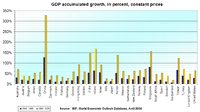
Photo from wikipedia
In a seminal article, Hanushek and Woessmann explained economic growth as a function of the quality of education. While they did not find evidence of the importance of years of… Click to show full abstract
In a seminal article, Hanushek and Woessmann explained economic growth as a function of the quality of education. While they did not find evidence of the importance of years of schooling, they argued for the relevance of cognitive skills and a basic literacy ratio for economic growth. However, this result was based on cross-country data limited to 23 observations. In this study, we extended and modified their approach based on the results of PISA (Programme for International Student Assessment) tests to explain the GDP changes over the last 50 years. Using panel data, we considered the possible lag that characterizes this relationship, used statistical methods to address the risk of reversed causality of economic performance affecting the quality of education, and extended the model by the inclusion of other potential growth factors. The results, which also included several robustness checks, confirmed the relevance of earlier education quality as a significant growth factor. Our results suggest the significance of educational skills for GDP growth, which might be treated as a confirmation of the importance of quality primary and secondary education for economic development. We showed that our results are robust to changes in the order of lags and confirmed the validity of the conclusion with the use of specification-robust Bayesian model averaging.
Journal Title: Sustainability
Year Published: 2021
Link to full text (if available)
Share on Social Media: Sign Up to like & get
recommendations!